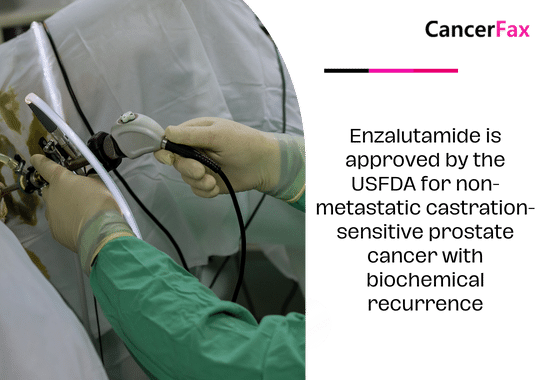The FDA has authorized enzalutamide for the treatment of non-metastatic castration-sensitive prostate cancer in cases of biochemical recurrence.
The Food and Drug Administration approved enzalutamide (Xtandi, Astellas Pharma US, Inc.) for non-metastatic castration-sensitive prostate cancer (nmCSPC) with biochemical recurrence at high risk for metastasis (high-risk BCR) on November 16, 2023.
The effectiveness was assessed in EMBARK (NCT02319837), a randomized, controlled clinical study involving 1068 patients with non-metastatic castration-sensitive prostate cancer and high-risk biochemical recurrence. All patients had undergone radical prostatectomy and/or radiation with curative intent before, had a PSA doubling time of 9 months or less, and were not eligible for salvage radiotherapy when they joined the study. Participants were randomly assigned in a 1:1:1 ratio to receive either enzalutamide 160 mg once daily together with leuprolide in a blinded manner, enzalutamide 160 mg once daily as a single agent in an open-label manner, or a blinded placebo once daily along with leuprolide.
The primary outcome studied in the study was metastasis-free survival (MFS), evaluated by an impartial central review, comparing enzalutamide with leuprolide to placebo plus leuprolide. Additional efficacy outcome measures were the median failure-free survival (MFS) for enzalutamide monotherapy compared to placebo + leuprolide and overall survival (OS).
Enzalutamide plus leuprolide showed a statistically significant improvement in metastasis-free survival compared to placebo plus leuprolide, with a hazard ratio of 0.42 and a p-value of less than 0.0001. Enzalutamide monotherapy showed a statistically significant improvement in metastasis-free survival compared to placebo plus leuprolide, with a hazard ratio of 0.63 (95% CI: 0.46, 0.87; p-value = 0.0049). During the MFS analysis, the OS data were incomplete, showing a 12% mortality rate in the total population.
Common side effects (≥ 20% incidence) in individuals treated with enzalutamide in combination with leuprolide were hot flush, musculoskeletal pain, weariness, fall, and bleeding. Common side effects of enzalutamide monotherapy include weariness, gynecomastia, musculoskeletal pain, breast tenderness, hot flush, and bleeding.
The suggested enzalutamide dosage is 160 mg taken orally once a day, with or without food, until illness progression or unacceptable toxicity. Enzalutamide can be given with or without a GnRH analog. Enzalutamide medication may be stopped if PSA levels are below 0.2 ng/mL after 36 weeks of therapy. Treatment can be restarted when PSA levels reach > 2.0 ng/mL for individuals who underwent radical prostatectomy or ≥ 5.0 ng/mL for those who have primary radiation therapy.

Targeting FGFR4 and CD276 with CAR T-cells demonstrates a strong antitumor impact against children rhabdomyosarcoma
Chimeric antigen receptor (CAR) T-cells that specifically target Fibroblast Growth Factor Receptor 4 (FGFR4), a surface tyrosine receptor that is extensively expressed in rhabdomyosarcoma (RMS), are now undergoing clinical research. However, the effectiveness of these CAR T-cells may be hindered by tumor heterogeneity and inadequate activation. In this study, we present a method to enhance the co-stimulatory and targeting characteristics of a FGFR4 CAR through an optimization process. We substituted the hinge and transmembrane domain of CD8 as well as the 4-1BB co-stimulatory domain with the corresponding domains of CD28. The CARs produced exhibit heightened anti-tumor efficacy in multiple RMS xenograft models, with the exception of the RMS559 cell line, which is known for its aggressive nature.

